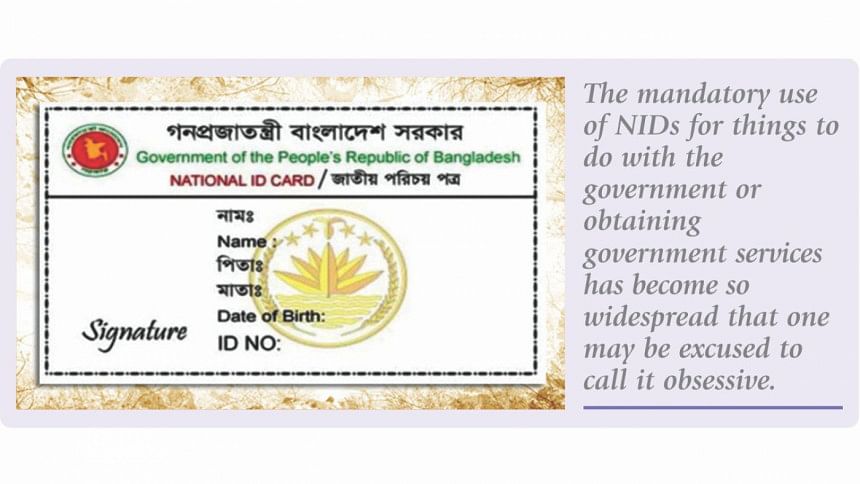The over-use of NIDs in Bangladesh

Recently, the policymakers have circulated the idea of the compulsory use of national identity card (NIDs) for purchasing something as simple as railway tickets. Their intended objective is to discourage price scalping of the railway tickets. How the measure would be contributing to the end is unsure, in the end, railway ticket scalpers are not aliens and they can use NID cards of their own and their near and dear ones for their trade. Indeed, while price scalping is perhaps only one of the reasons of the artificial crisis of railway tickets, reserved tickets for the very important persons (VIP) must also have contributed to the tickets disappearing beyond the means of many ordinary citizens of this country. During the periods of high demand or the tickets such as air-conditioned berths which are in higher demand, the excesses of VIP tickets are well-documented.
The mandatory use of NIDs for things to do with the government or obtaining government services has become so widespread that one may be excused to call it obsessive. In some matters such as basic banking and non-banking financial activities or applying for a passport, because of the significant risk such as terrorist financing or other perennial interests being involved, the rationale behind this is convincing. However, the list of matters regarding which NID is compulsory is so long that the proper question is which those rare cases are where you can obtain a governmental service without your NID. Now with its smart version being available for many citizens, the National Election Commission is planning for its more widespread use. With the expanding list of things for which NID is needed in this country, as ludicrous as it may sound, in the near future retailers may ask for NID cards for using their loyalty cards.
We should perhaps look back and remember that NID in this country was introduced as a tool for voter identification during local and national elections. Then its extension as a tool for curbing terrorist and criminal activities by impersonation is perhaps warranted and, at worst, a necessary evil which many of us may be prepared to accept like air travellers in some airports undergoing scanners which may be equated with a form of stripping. But beyond these peripheries, the more we promote the use, and more authorities get involved with it, the bigger would be the potential abuse and the bigger concerns citizens may and should have.
Sociologists may be far better placed to say this but dare I say the addiction towards the compulsory use of NIDs may have something to do with our penchant for bureaucracy and papers. Very rarely our public officials are happy with fewer papers. It seems like that the more paper people have to submit to the authorities, the more important the concerned authority becomes. The bundle of papers submitted gives the authority to whom they are submitted a nice way to feel soaked up in work and important and may be an excuse to prolong the work. Even many of us who have to submit those bundle of papers often not holding any grudge may be a colonial legacy, after all, our forefathers had to be attuned to the bureaucracy of the colonial masters and their servants.
In many countries, the use of NID is not as pervasive as it is in this country. Even in many countries, something like a prepaid mobile SIM card, often perceived as being linked to national security, can be purchased without the need for any identity card whatsoever. That does not in itself mean that we need to follow their example, but it may give a clue that the administration of many countries is aware of the potential abuse of personal information containing papers.
It is disconcerting that the incidence of abuse of NIDs such as a single NID card being used for more than 1000 mobile registrations (of course in that era when the fingerprint was not needed) does not seem to make our policymakers appreciate the serious potential of abuse of NIDs. Our policymakers should appreciate that the more widespread the use of something like NID containing personal information makes it more prone to use. Like many other things in life, this is probably a fitting case where the less is more.
THE WRITER IS AN ASSOCIATE PROFESSOR OF LAW, NORTH SOUTH UNIVERSITY.

 For all latest news, follow The Daily Star's Google News channel.
For all latest news, follow The Daily Star's Google News channel. 



Comments